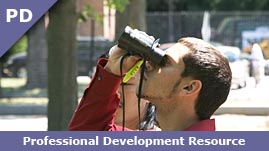Teachers' Domain - Digital Media for the Classroom and Professional Development
User: Preview

Source: ITEST Learning Resource Center


Collection developed in collaboration with the Educational Development Center's ITEST Learning Resource Center (LRC).

In this video we see both Bioacoustics and Urban Trees curriculum projects in action: students learn the basic physical and ecological context of their field studies, experience the technical aspects of field data collection, gain a working knowledge of cutting edge data analysis software, and develop hypotheses with respect to their data that can be tested experimentally.
Urban Ecology is a comprehensive project developed by the Urban Ecology Institute and Boston College to provide 7-12th grade teachers and students with scientific, instructional, and technological training in urban ecology field studies. The program introduces two curriculum modules: Bioacoustics and Urban Trees, designed to help students learn science by studying the ecological health of their own neighborhoods. To best serve the Boston Public School district, where a majority of students are minority or economically disadvantaged and have reduced access to emerging information technologies, the program offers comprehensive curriculum materials with multiple entry points to fit any school’s technological resources, from advanced computer analysis and modeling technologies to low-tech alternatives to implementing the curriculum.
In this video profile we see both Bioacoustics and Urban Trees projects in action: students learn the basic physical and ecological context of their field study, experience the technical aspects of field data collection, gain a working knowledge of cutting edge data analysis software, and develop hypotheses with respect to their data that can be tested experimentally. Students are engaged in authentic scientific investigations that inform urban planning and design, and are empowered by knowing the outcome of their research effects how the city itself behaves. Urban Ecology gives students a powerful experience to re-envision their neighborhoods and the world around them and their role in shaping it.
• Can you create opportunities to reinforce scientific inquiry skills, writing and oral presentation skills by having students present findings and recommendations to peers?
• Are there medium to low-tech options for implementing your IT-based curriculum in the classroom?
 Loading Standards
Loading Standards Teachers' Domain is proud to be a Pathways portal to the National Science Digital Library.
Teachers' Domain is proud to be a Pathways portal to the National Science Digital Library.
